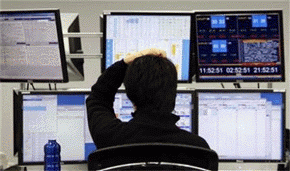

On Friday the EUR underperformed while the AUD was the strongest performer amongst its major peers.
The EUR was under renewed pressure on Friday night as ECB President Draghi said that policymakers would “do what we must to raise inflation as quickly as possible”. That catch-phrase was prefaced with; “If we decide that the current trajectory of our policy is not sufficient to achieve our objective…” The EUR declined, as an expansion of ECB easing at the Bank’s Dec meeting looks likely. The EUR/USD traded down from above 1.0720 to end the week close to 1.0650.
However, Bundesbank President Jens Weidmann, speaking at the same conference, said that the fall in crude oil prices was “more of an economic stimulus for the euro area than a harbinger of deflation”, and that he saw “no reason to talk down the economic outlook and paint a gloomy picture”.
CFTC speculative positioning data, released on Friday, showed that EUR net shorts extended from 142.9k to 164.2k (though this remains well below the record short position of 226.6k reached in March this year).
The decline in the EUR on Friday night also dragged down most of its European peers. The GBP/USD traded down from late evening highs above 1.5300, to end the week at 1.5190.
By contrast, the AUD was the strongest performer on Friday night, extending its gains since Thursday morning. Sentiment toward the AUD was likely helped by stabilisation in commodity and equity prices on Friday night. From early evening lows near 0.7190, the AUD/USD ended the week at 0.7240.
The CFTC speculative data showed net AUD short positions extended significantly, from 52.8k to 66.5k. This puts it in ‘extreme’ territory, suggesting the AUD is more vulnerable to short-term bounces on less-than-negative data flow. However, over the medium-term we still see further downside for the AUD/USD.
The NZD/USD traded a fairly unexciting path sideways on Friday night, between 0.6550 and 0.6590. On the crosses, the NZD rebounded versus its European peers, but retreated against the AUD. The NZD/AUD slipped from 0.9160, to end the week around 0.9070. The cross is now back within its fundamental ‘fair value’ range that we calculate to be between 0.8960 and 0.9250. Support for the NZD/UAD will be encountered on any move toward 0.9000. Resistance is eyed at 0.9160.
Look out for NZ net migration data today and Eurozone and US PMI data tonight.
Get our daily currency email by signing up here:
Daily exchange rates
Select chart tabs
Kymberly Martin is on the BNZ Research team. All its research is available here.
3 Comments
Ah, central bank chatter again. A few facts to be noted:
1. Germany's Merkel preferred ex Goldman Sachser Draghi to a Bundesbank functionary to take over the helm of the ECB, as she knew it would be much easier to do crooked deals with an Italien banker. So much about political support for the Bundesbank.
2. Weidmann has a long-standing history of being ignored by Draghi et al. This is mainly due to the one country one vote system in the ECB. Germany carries about 25% of the financial risk while holding 5% of the voting rights.
3. Therefore any suggestion of a competition of ideas in the ECB is unfounded.
Draghi's mission is to drive up inflation and suppress the Euro exchange rate, consistent with the policies of inflation and devaluation which have turned Italy and France into economic powerhouses in the past decades.
A short on Euro remains a plausible strategy.
can you / how do you short everything though?
No, not everything.
I - dont laugh - actually think that NZ investments are a lot more on the long side. Germany is the EU's economic powerhouse and due to unique acts of political idiocy currently putting her social and economic stability on the line. Since early September 2015 a shocking 500000 illegal immigrants have been registered in Germany, and a few hundred thousand are in the country not even registered. Imagine the gigantic destablizing effect not only on Germany. 2 of the Paris terrorists came in a refugees, for starters. Plus there will be spill-over effects, once Germany cannot house and feed the masses. In other words: I believe that a lot of money will leave Europe in the mid to long term and some of it will go to NZ.
Secondly, short-term, due to ECB money printing, European stockmarkets still look like a buy to me, while US markets seem to flatten.
Btw, I just do not understand, why interest.co.nz is presenting article after article on climate change but not on the current illegal migration and terrorism disaster unfolding in Europe. I think the latter will have much stronger economic reverberations, at least in the mid term.

We welcome your comments below. If you are not already registered, please register to comment
Remember we welcome robust, respectful and insightful debate. We don't welcome abusive or defamatory comments and will de-register those repeatedly making such comments. Our current comment policy is here.